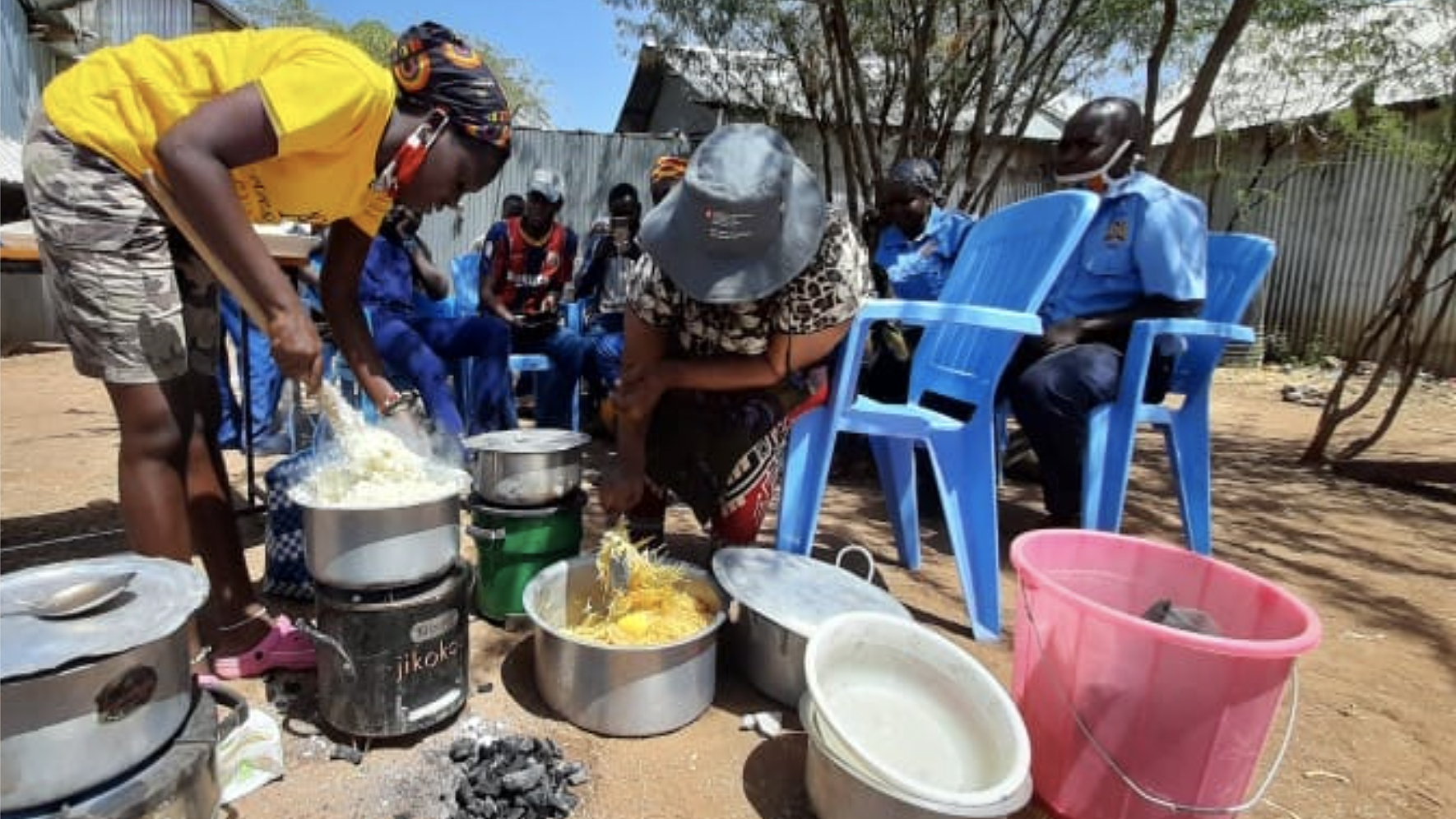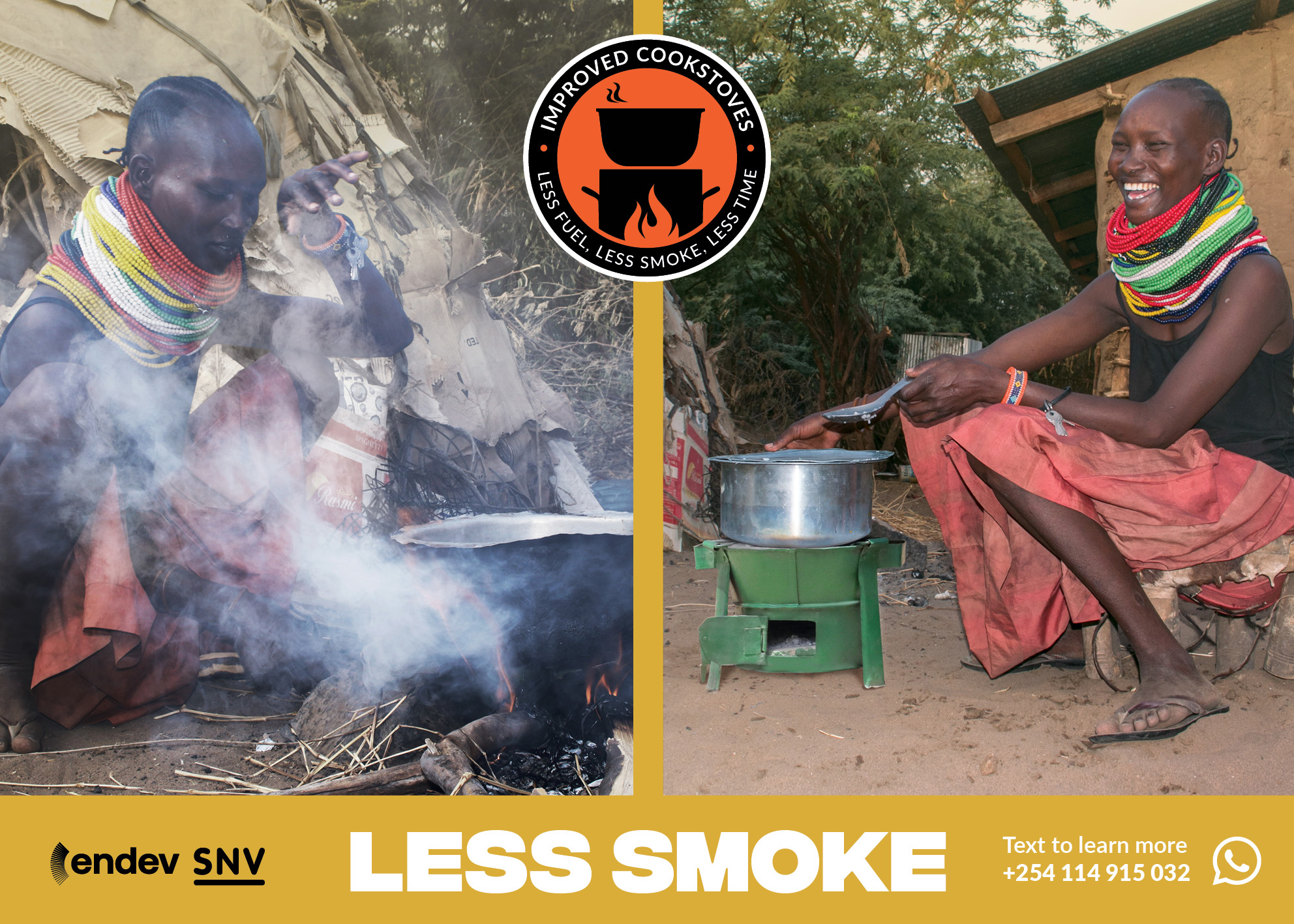PARTNERS:
SNV Kenya
LOCATION:
Kenya
PARTNERS:
SNV Kenya
LOCATION:
Kenya
Daily life in Kakuma Refugee Camp requires a lot of firewood and charcoal for meal preparation. This is caused by the primary reliance of host and refugee communities on inefficient cooking practices such as open fires and basic firewood and charcoal stoves. More than just leading to high fuel use and expenses, these practices also increase safety risks, environmental degradation, and health issues.
To break this status quo, SNV Kenya has been working to support stove companies through the EnDev Market Based Energy Access (MBEA) II project to develop distribution channels in and around the camps. This initiative has resulted in a substantial increase in the availability of various improved cooking stoves in the local markets.
SNV appointed 17 Triggers to support in the development of a behavior change campaign that would increase awareness, purchase, and consistent use of the improved cookstoves for household and commercial purposes.
Due to the Covid-19 pandemic our team was unable to travel to Kenya. Not deterred by this, we pushed boundaries and adapted our research methods and approach which enabled us to work virtually through the SNV Kenya team who became our eyes and ears on the ground.
The first task was to identify the barriers that prevented people from upgrading from their current cookstoves. To do this we conducted formative qualitative research and testing with households, eateries, community leaders and humanitarian agencies.
We learned that there was general interest in new technologies but that the fast-changing cookstove supplier landscape was confusing to local audiences – they did not know what was available, nor did they trust that it would be available well into the future – especially if it relied on a new kind of cooking fuel that might not be readily available.
One of the main barriers was found to be price. Even if improved cookstove models were available in the camp or town markets, locals would automatically exclude them as an option based purely on affordability (a reasonable reaction when you consider that the stones on a 3-stone stove are free and people often have limited resources).

Locals try out the improved cookstoves to experience their efficiency hands-on.
We soon realized that despite interest and awareness, households and eatery cooks were not convinced that the improved cookstoves would use less fuel, be more time-efficient or reduce exposure to smoke.
We decided to tackle this early on and tested the idea that cooks would be convinced of the benefits if they could actually try an improved stove and experience the difference in performance. Our hunch was right – trial participants immediately saw great benefit in having stoves that used less firewood or charcoal. Participants also realized that they could prepare more dishes using the same fuel – a great finding for eateries. Additionally, participants also witnessed the time that was saved by using the improved cookstoves due to faster cooking times, and less time spent cleaning. This meant more time available to spend on income-generating activities or family responsibilities.
– Mawazo Restaurant
Our research findings informed the campaign development in which 3 key benefits guide the messaging: ‘Less fuel’, ‘Less smoke’ and ‘Less time’. The campaign connects the practical benefits of improved cookstoves to people’s aspirations and desires, while providing linkages to local stove vendors.
Through rapid testing we developed and validated a number of campaign messages, tools, and activities that would clearly communicate the benefits of cooking with improved cookstoves.
The campaign kicked off in June 2021 and uses a mix of offline and online tools, activities, and channels to reach the audiences, working closely together with stove companies. For example, local stove vendors use branded campaign messaging and are trained on informing customers on the benefits of the improved stoves they sell. Market demonstrations are organized on a weekly basis in which community members can cook their favourite dish for their families using an improved stove. Other activities include a poster and radio campaign, door-to-door flyer handouts inviting people to reach out to a ‘human chatbot’ on Whatsapp which will provide information about available stoves and nearby stove vendors, and a ‘stove library’ which enables eateries to try out an improved stove for a week.
Messages were crafted in kiSwahili and English as the predominant languages in Kakuma, but we kept materials low-text and as visual as possible to appeal to the 20+ nationalities who live in the camps.
Brian Oyenge, CEO of Usafi Green Energy and MBEA II project stove company partner, stated “The Behavioural Change Campaign makes a great positive impact on our market network in Kakuma. Through the campaign, our market base of clean cookstoves has already significantly increased based on the recent sales numbers”.

The key visuals of the campaign compare and showcase the benefits of cooking with an improved cookstove.